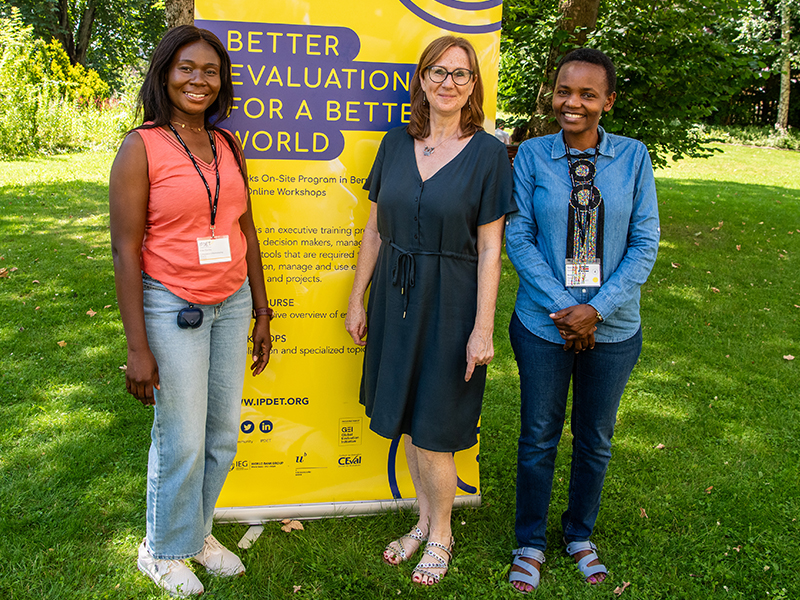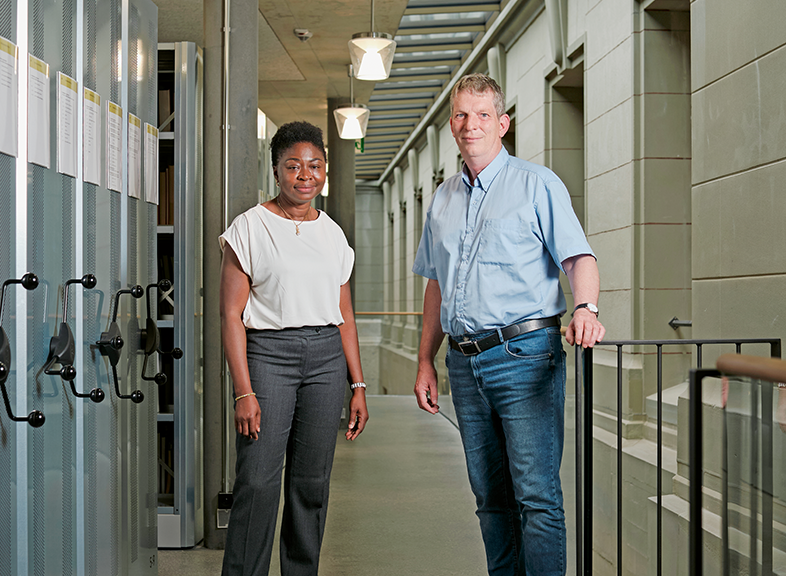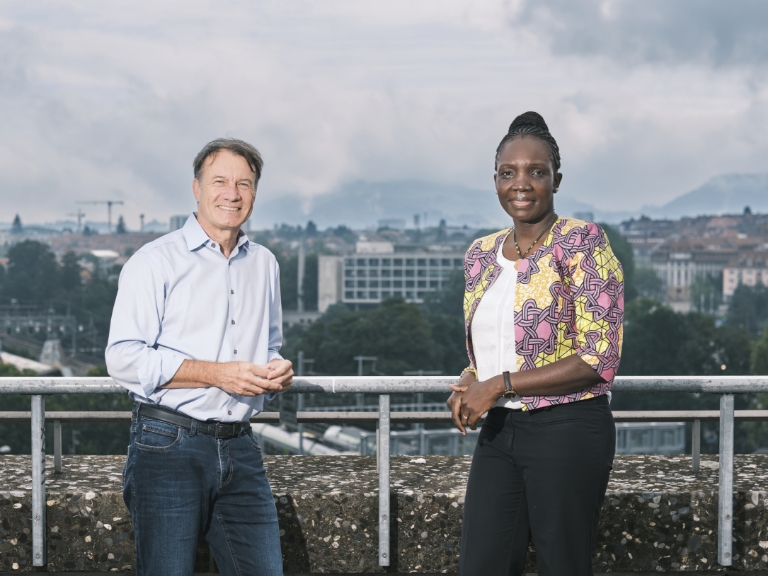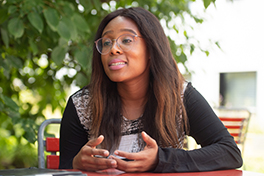Continuing education on development work
“Times of crisis require more evaluation”
Those responsible from government authorities and international organizations are learning new methods for evaluating development programs in the Global South at the University of Bern. This training is particularly valuable given current budget cuts in the field.

On this Wednesday morning in mid-July, over 170 people from all over the world meet in the foyer of the UniS building, their English interspersed with dozens of accents. At the entrance to the foyer there is a world map that shows where the participants in this year's “International Program for Development Evaluation Training” (IPDET) come from: Cape Verde, Lesotho, Niger, Zimbabwe, Lebanon, the United Arab Emirates and Yemen ... – a total of 71 countries.
Aha moments during training with case studies
The ringing of a traditional Swiss cowbell signals the end of the break. The participants are spread across different rooms and work in groups on case studies. For example, the evaluation of an agricultural project in Sri Lanka that aims to increase the productivity of small farmers through sustainable farming practices. Wrapping paper hangs on the walls on which the procedure and goals are outlined with arrows and colored cards. The cards contain terms such as impact, outcomes, participation and theory of change. Groups of eight discuss which form of evaluation is most meaningful in this case, what the central questions are and where the limits of meaningfulness lie. The knowledge acquired in theory blocks is applied directly. The results are then presented in larger groups.
One of the participants is Vida Opoku from Ghana, a specialist in monitoring and evaluation at the NGO “Compassion International”. She has been working in the field of evaluation for ten years and supports the impact measurement of NGOs in Ghana. She says she acquired most of her knowledge “on the job” herself. “At some point I had the feeling that I wanted to put down deeper roots in my professional life and further expand my skills.” Opoku says she experienced numerous aha moments in the first three days. “In our work, for example, we talk a lot about a ‘theory of change’, which shows how and why a desired change can be expected in a certain context. For the first time, I really understood why this theory is important and how it can be used efficiently in practice.”
“This is an important contribution to ensuring that more women take on leadership roles in development evaluation in the future.”
Vida Opoku
Opoku also appreciates that she gains insights into the work of her international colleagues. One idea that she has taken up and wants to incorporate into her daily work is creating a checklist to more efficiently evaluate which external service providers are best suited for certain tasks. “I also think it’s great that so many women are taking part in this program,” says Opoku. This year, around 70 percent of participants are women. “This is an important contribution to ensuring that more women take on leadership roles in development evaluation in the future.”
Internationally recognized program
In addition to employees from NGOs, universities, companies and freelance consultants, most participants come from government authorities. The quality of the training is now widely recognized, says Stefanie Krapp, head of IPDET at the University of Bern. “Many governments in the Global South send their experts to us so that they can later set up a robust evaluation system at home.” Most participants remained in contact and some later worked together on evaluations. “That’s exactly what makes our program so unique.”
“Many governments in the Global South send their experts to us so that they can later set up a robust evaluation system at home.”
Stefanie Krapp
Last year, the Mongolian participants founded the first national association for evaluation following the program. This year, two members of parliament from Nepal and Mongolia are on site, and the government of Tanzania has sent seven civil servants, says Krapp.
Development cooperation at eye level
“Gone are the days when international donors from the North evaluated 'their' programs in the Global South,” says Candice Morkel, director of the Center for Learning, Evaluation and Results Anglophone Africa (CLEAR AA) at the University of the Witwatersrand in South Africa, and one of the program's instructors. “Today the states do it themselves.” The involvement of local actors such as governments, NGOs and communities in international cooperation and respect for state sovereignty have become more important. “We want to ensure that those responsible have the necessary knowledge and skills.”
“There is a new awareness that monitoring and evaluation are central to making development measurable and progress visible.”
Candice Morkel
In Africa, monitoring and evaluation departments have been set up in many government agencies in the last 15 years, she says. This is also a consequence of the 17 UN development goals (Sustainable Development Goals; SDGs), which the United Nations proclaimed in 2015 to combat poverty and hunger. Since then, states have had to submit an annual report to the United Nations in New York documenting progress in achieving these 17 goals. “There is a new awareness that monitoring and evaluation are central to making development measurable and progress visible,” says Morkel. This is also a benefit for civil society: “Based on this data, they can hold the government accountable for wrongdoing.”
Problematic budget cuts in development cooperation
What Stefanie Krapp and Candice Morkel are currently worried about are the budget cuts in development cooperation, including in Switzerland. The SDC budget is to be cut by billions in favor of Ukraine aid and the military budget. “The effects are immediately noticeable for us,” says Krapp. Bilateral development organizations would have less money and governments in the Global South could invest less in the further training of their employees. “In times of crisis, even more emphasis should be placed on evaluation in order to make the best possible decisions.” In addition, there is the stricter visa policy in Switzerland: “16 potential participants could not come because they did not receive a visa,” says Krapp. From Uganda, for example, seven people qualified for the program, but only two were allowed to enter. “We had fewer problems like this before.”
Learning material for the entire team
Lilian Wawa from Tanzania received a visa and is very happy to be one of this year's participants. She is responsible for monitoring and evaluating anti-poaching programs at the Tanzania Wildlife Management Authority. She leads a team of six employees and is also responsible for monitoring the authority's annual and five-year plans. «I want to do my job properly as a group leader and for that I need specific skills. I can get these here at IPDET,” she says. The program is also Wawa's first formal training in the field of evaluation.
“I am in a group with experts from Serbia, Mexico and Azerbaijan and can learn a lot from them.”
Lilian Wawa
In addition to the learning blocks, she also values the exchange of experiences with colleagues from all over the world. “I am in a group with experts from Serbia, Mexico and Azerbaijan and can learn a lot from them.” The knowledge acquired here will benefit not only her, but her entire team. “In the first two days, I photographed many Power Point presentations and sent comments via WhatsApp to my team and colleagues at ministerial level,” she says. “The feedback was: ‘That’s great! Be sure to send us more of them.”
About IPDET
The International Program for Development Evaluation Training (IPDET), which is being held in Bern for the seventh time this year, is organized by the World Bank Group, the Center for University Continuing Education (ZUW) at the University of Bern and the Center for Evaluation (CEval) at Saarland University. Founded in Canada in 2001, the program has been held at the University of Bern since 2018. It consists of a one-week core course on the basics of evaluation, followed by a week of workshops on specific topics and the latest developments in the field of monitoring and evaluation. Since 2020, the workshops have also been offered online. Participants from organizations with limited financial resources, especially from the Global South, can apply for financial support provided by the World Bank's Global Evaluation Initiative. Around half of the 167 participants benefit from such support. Over a thousand had applied for such a scholarship.
Subscribe to the uniAKTUELL newsletter

Discover stories about the research at the University of Bern and the people behind it.


